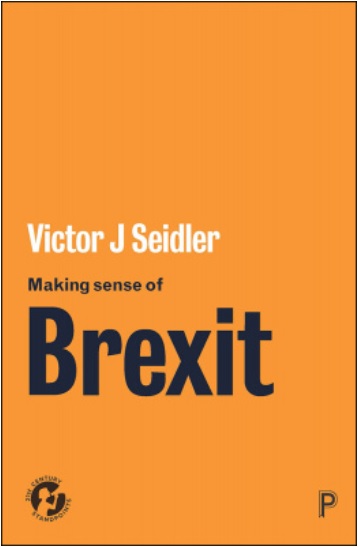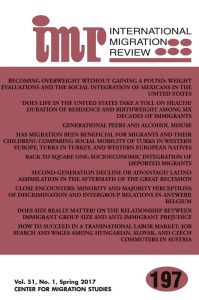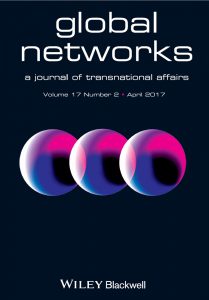Making Sense of Brexit: Interview with Victor J. Seidler

Victor Jeleniewski Seidler is Emeritus Professor in the Department of Sociology, at Goldsmiths University of London. His research interests include social theory and philosophy; Marxism and critical theory; moral theory; masculinity and sexual politics, and he has written on social theory, ethics and gender, particularly in relation to men and masculinities. In recent years his writing and research have focused on the cultural memory of particular events, including 9/11 and 7/7, and the ways they might challenge traditional social and cultural languages. His 2018 book Making Sense of Brexit, Democracy, Europe and uncertain futures (Policy Press) addresses the causes and implications of Brexit, exploring this moral anger against political elites and people feeling estranged from a political process and economic system that no longer expressed their will.
How did the book come about?
Over the past 10 years I’ve spoken about events which I not only experienced as disturbances, but which I saw as disturbances to the social theory that I had learnt. As well as 9/11 and 7/7 there were earlier critical moments, for example the 1998 Kosovo intervention, for which I was thinking about the notion of humanitarian intervention and what that meant; how could war, or sending military violence be a form of humanitarian intervention? I was disturbed by the recognition of neighbours being at war with one another, people who’d grown up and relied on one another now suddenly being at war. Experiencing these types of disturbances, I also felt social theories themselves were being challenged, which prompted me to step back and rethink the sources we had relied on. With the Brexit book, I was writing again out of this feeling of unease at an event, as a practice of making sense of it, thinking about the strengths and weaknesses to sociology. I felt it that was then right to have it as part of a public discussion.
How did you navigate through the arguments surrounding Brexit?
I listened to the different voices and arguments of those voting remain and voting leave, and used ethnographic interviews conducted by myself or by journalists, to look beneath surfacing questions of racism and xenophobia, to try to understand the anger people felt of being left out a political process. This meant engaging with questions of austerity, with the banking crisis, questions about changing policies in the EU, how the EU saw itself as a transnational project, and what that meant for people feeling that they were disempowered. Through the agenda of New Labour, and the aftermath of the financial crisis, people felt that they had no voice about what was going on in their own communities. Major corporations had closed shops in towns where these shops and spaces had carried important memories; communities destroyed without any sense of how to think back our notion of neoliberal progress.
How do you think Brexit has challenged sociology?
In writing the Brexit book, I recognized how sociology – or the development of sociology – meant that we didn’t know how to understand what had happened; we didn’t predict it, or even recognize that it was a real danger. I’ve been questioning what it was about the sociology that had become transnational, in an important way, just as the EU was a transnational project, so that nationalism was seen almost as negative.
The transnational and cosmopolitan consciousness – the sense that certain identities are constantly renegotiated and in process and in movement – didn’t give us the intellectual sources to understand what happened. The dominance of a certain type of poststructuralist discourse theory meant that as an analyst you didn’t really have to listen to different levels of people’s experience. Poststructuralism stood out apart from the people it was analyzing, and there was a sense that from its outside, impersonalized, detached position it could somehow know in a sense of being superior what discourses were shaping the experience of everyone else. Sociologists stood apart, and there still is in sociology a strong, relatively posthumous tradition of being right, of having the correct analysis. It’s only very recently that we’ve seen a shift back to ethnography and even community studies, and sociologists are starting to reevaluate projects that were in British sociology in the 1970s even before the poststructuralist, such as the feminist notion of relational sociology.
You mention feminism there, how has this influenced your work?
I was in the USA in 1970, during the very strong Bread & Roses women’s movement in Boston and Cambridge. The women’s movement seemed to me to express certain relationships to the notion of the transformation of everyday life and voice, which I’d understood through philosophical studies, particularly Wittgenstein. It also raised the importance of speech and language, not as discourse, but as finding words in order to express your experience. Feminism gave me an ethnographic of how important it was to find your own voice.
I recall after living in Boston that feminism was a radical challenge to sociology, much more than Marx was. Marx framed injustice and oppression as real only if it took place in the public sphere, whilst feminist concerns are almost always coming from within the private and personal. This feminist viewpoint, the framing of the personal and the importance of finding a voice, influenced my work on masculinities as I framed relationships between certain types of European modernities and certain forms of white colonial masculinity. In many ways it was a decolonizing project, just in being able to name masculinities in a particular way, and name the claiming of a certain rationalism as male.
How do issues of gender feature in the book?
It looks at masculinities and how those were played out, trying to understand the masculine terms of the referendum campaign, and how women were marginalized, how young people weren’t listened to, the emerging dominance of particular form of masculinity – the boys fighting out in ‘a boy’s game’ – alongside questions of migration, immigration, and race, and how to think about them.
There was a real failure of the media in giving often male leaders the space as spokespeople to debate and discuss, as if this event was just a debate or discussion. The language of control became absolutely vital in the debate, and it touched something visceral within certain communities. When you talk about controlling borders, you are also talking about controlling bodies, and this raises questions about who’s bodies, and in what way is that body gendered, and who’s getting control over what body? There’s a gender violence that was part of the UKIP frame – that traditional form of hypermasculinity that Nigel Farage represented – and there are increasing dangers in term of gender and sexual violence in the face of that. These are important connections to make and sociology is a critical discipline to be able to frame those concerns in that way.
What has it meant for you personally, in writing this book as a practice of understanding?
There’s been a framing in my work for some time about the notion of roots and rootedness. There’s a been conflict between ‘roots’ and ‘routes’ in the sense of looking backward and forward, and the value placed on that within the universalist consciousness. The search for your own family roots was less important, or unnecessary, to the creation of new hybrid identities in the present, and the routes or journey your family was taking. That never felt right to me, that opposition felt unhelpful, but it was very powerful, and very powerful in dismissing a certain rootedness or belonging.
I think it made sense because of my parent’s migration. My family were refugees from Nazi Germany, from Vienna and Warsaw, but I didn’t really have a way of engaging with that history. I’d learnt to put it aside. That history belonged to my parents and was none of my business, and my task was to become British in a particular kind of way. I carried these histories, and as you get older you feel even more that there’s this history that you carry, in my case the holocaust histories. Only in the 1980s I wrote a book called Shadows of the Shoah, on Jewish identity and belonging, and I realized that one of the things that had drawn me to Marx was this notion on the Jewish question, which meant that in order to become human you had to transcend particular types of identity. You had to transcend being a woman, or being gay, or being Jewish; any religious or ethnic identities had to be transformed in order to be human. In not having to engage with my own history, as a Marxist, I became universalist.
Around the time of the Brexit vote we witnessed the reemergence of anti-Semitism, both in Britain and across Europe, particularly in the recent Hungarian election. Suddenly anti-Semitism was refigured – and in the Brexit vote, as people were critiquing the corporate character of the EU, I felt that the peace that it had provided across Europe was crucially important, and also the healing of these bits of my own family history.
Part the analysis of it was recognizing how I had been challenged, and how I was positioned racially as potentially foreign. The question of racism and how to understand racism and its relationship with islamophobia and the question of immigration, all these things had to be thought about in a different way.
What next for Britain?
The differences between Donald Trump’s America and the British colonial history, colonial memories, and the place of slavery, are quite different. Britain looked for a moment like it wanted to reproduce an anglophone, white, post imperial empire, and there was a moment when the alliance between Teresa May and Donald Trump looked possible, because the EU had presented a post-colonial possibility where Britain, as part of Europe and part of a block, could find a new European identity in the world. But Britain has never dealt with its colonial history, and so its history is still haunting it. It was there in the Brexit referendum posing as a certain nostalgia – that sense of making Britain great again – that Britain can survive on its own. Even the notion of a global Britain carries uncanny imperial resonances, so we don’t know what that future outside Europe looks like.
We need to open a dialogue for how divided the country is, as it’s much more divided than we recognized. Some compromise is needed, and with this some engagement with Britain’s colonial history. In echoing the notion of Britain being great again, we need discussions with people from EU and other countries whose presence has been so unsettled, and how the Brexit vote has done such damage to people’s sense of place and belonging. The challenge of reimagining Britain as a multicultural, multi-faith society, and as a nation state part of Europe really needs focusing on, otherwise the damage will be a small-scale isolationism, which will be horrendous.
We also need to consider all the ecological issues about global warming and how that is placed politically. We’re facing an immediate threat in global warming which has already moved beyond the stage that we thought it could have been prevented, or stopped. The population movements that are happening globally are partly what stimulated these migratory challenges – the movement away from Syria, a land that can no longer be farmed, where people can’t have protected lives, and the migration of people into the cities – these kind of population movements are going to make the future difficult.
What next for Sociology?
The question is whether a cosmopolitan universalism, and a sociology that is framed though a cosmopolitan universalism that is transnational has the appeal of a younger generation of no borders. A generational conversation must happen because its proving that the nation state across Europe is not going to disappear. The conservative right is strengthening – the recent Hungarian election shows you that the question of race and migration is becoming an everyday discourse. The Islamophobic mentality that “we’re not going to let them in because of what they do in other countries” is providing an anti-immigration rhetoric that is deeply racist, and anti-Semitic, and homophobic. These are all areas that sociology has contributed to and I think sociology really needs to be part of the answer, and at least part of the process of questioning and listening. I strongly feel that sociology hasn’t necessarily asked itself questions about why, even though it listened – or learnt to listen – it didn’t seem to hear what was coming. Thinking about some of the sources and questions that turned sociology in a certain direction –it’s not a matter of going back, it’s a matter seeing where we are now and critically asking questions; what can we hear and what can’t we hear? What do we judge, and what’s the nature of judgement and evaluation? What is the practice of making sense of something that challenges your traditional forms of social theory? I think it means forms of theoretically informed ethnographic work that isn’t necessarily theoretically driven.





1099-0860/asset/NCB_logo.gif?v=1&s=40edfd0d901b2daf894ae7a3b2371eabd628edef)